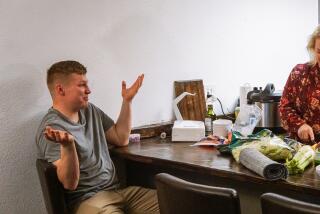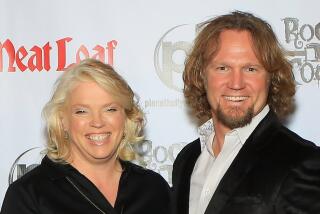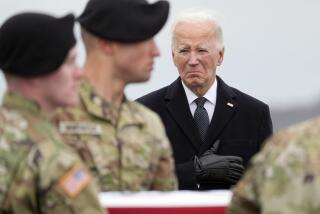Army Staff Sgt. Sean Diamond, 41, Dublin; killed by roadside bomb in Iraq
Every March 17, Sally Wiley would call her son Sean Diamond at 7:38 a.m. and his twin Michael Diamond five minutes later -- the moments of their births -- to sing them “Happy Birthday.”
Some years, the twins couldn’t answer, letting their mother’s song go to voice mail.
In the last few years, when Sean, an Army staff sergeant, was stationed in Iraq, Wiley couldn’t call him. Instead, she would look at the clock on March 17 and feel something missing and then call Michael.
“We’d laugh because [Sean] didn’t have to get the early morning call,” she said of the ritual that began during the twins’ first year at college.
On Tuesday, Wiley still made two calls, but both to Michael -- one to his home and the other to his cellphone.
Sean was killed Feb. 15 when a roadside bomb exploded near his vehicle in As Salam, , south of Baghdad. He was a heavy equipment operator with the 610th Engineer Support Company, 14th Engineer Battalion, 555th Engineer Brigade at Ft. Lewis, Wash. He was 41.
When Michael Diamond, 42, heard the birthday songs last week, both of which went to voice mail, “I thought now she’s only got one son to sing it to; she used to have two.”
On her sons’ birthday, Wiley held a memorial for Sean in Gardnerville, Nev., where she now lives. She called it a celebration of his life, and showed photos of him as a child with his two brothers, with his four children and him as a pilot.
Those who knew him best say Sean loved two things in life: family and flying.
When he lived in Berkeley with his twin brother in the early 1990s, Sean got his private pilot’s license and would rent a single-engine plane and fly around the Bay Area, passing over Alcatraz Island, the Oakland Coliseum and near the Golden Gate Bridge, Michael Diamond said.
On Sean’s first date 15 years ago with his future wife, Loramay, he took her flying.
When Sean and his wife settled in the Northern California community of Dublin, southeast of San Francisco, and started a family, he found less time to fly.
But Ruth Villar, Loramay’s sister, remembers him sitting outside with his children listening on a radio scanner to the chatter of pilots from the nearby airport.
“He loved flying when he got the opportunity,” she said.
On Feb. 19, Sean’s body was returned home from Iraq on a private flight that landed at Livermore Municipal Airport, the same airport that more than a decade earlier, he used to practice landings, his brother said.
Sean first joined the Army in 1987, spending two years in active duty and six years in the Army Reserve. After a brief break, he reenlisted in 2000 and returned to active duty in late 2001.
“Mostly just to provide for his family,” Villar said of her brother-in-law’s reason for returning to the Army. “Everywhere he went was with his wife and his kids.”
The family was stationed for several years in Germany, from where he was deployed to Iraq before the family moved to Ft. Lewis in 2006, Villar said. Sean was on his third tour when he was killed.
In addition to his wife, mother and twin, Sean is survived by his four children, Taylor, 13, Madison, 10, Sean Riley, 8, and Athena, 5; his father, Gerald Stump; and a younger brother, Jason Diamond.
Wiley visited her son last year at Ft. Lewis before he began his last tour and remembers telling him, “Why are you doing this? You’re getting kind of old.”
“Because they still need the help, Mom,” Wiley said he told her. “He cared about what he was doing, and he was good at what he was doing.”
Michael said his brother loved the Army and was proud of the roads and buildings his unit was constructing in Iraq.
“Don’t listen to all this stuff you hear on the news,” Michael said his brother once told him. “We’re actually doing really great things over here.”
Shortly before Sean left for his first tour in Iraq, he went to see his twin in Seattle near the end of 2001. Michael had been diagnosed with non-Hodgkin lymphoma and was in remission for six months after chemotherapy. But when the disease came back, doctors told him his only option was a stem cell transplant.
He asked Sean to get tested and, as expected, the identical twin was an exact match.
“He was happy to do it. I remember because we kind of hung out for a week” before the transplant, Michael said.
Sean had never been to Seattle and the brothers went out drinking and visited the Museum of Flight. It was one of the last times they really spent time together.
“I wouldn’t even be here if it wasn’t for him,” Michael said.
More to Read
Start your day right
Sign up for Essential California for the L.A. Times biggest news, features and recommendations in your inbox six days a week.
You may occasionally receive promotional content from the Los Angeles Times.







